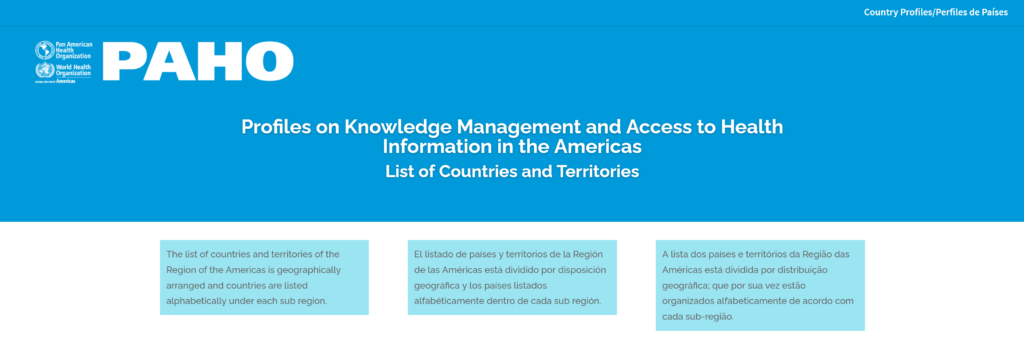Until recently, it was challenging to find information about strategies, policies, and roadmaps on knowledge management, which bibliographic databases, consortiums provide access to health information as well as to learn the scientific productivity per country and territory in the Americas.
This is now changing with the launch of the Profiles on Knowledge Management and Access to Health Information in the Americas, a landscape of documents, statistics, networks, and indexes related to health information in the Region.
 The profiles are produced by the Pan American Health Organization, through the Department of Evidence and Intelligence for Action in Health (EIH). The goal is to help PAHO Member States to have prompt access to this information and provide an integrated view of the resources and metrics related to health information. Examples of information available in the country profiles are:
The profiles are produced by the Pan American Health Organization, through the Department of Evidence and Intelligence for Action in Health (EIH). The goal is to help PAHO Member States to have prompt access to this information and provide an integrated view of the resources and metrics related to health information. Examples of information available in the country profiles are:
- Strategies, policies and framework related to knowledge and information access
- Statistics and metrics of scientific production in bibliographic databases
- Participation in networks such as the Virtual Health Library and other initiatives in cooperation with the Latin American and Caribbean Center on Health Sciences Information (BIREME)
- Consortiums providing access to scientific and technical literature in health
- Rank of Information and Communication Technologies Development Index.
As a work in progress, the profiles will be updated periodically and as more information and relevant data are identified. In the long run, the profiles will bring more awareness of the advances in knowledge management, information access, and the digital landscape across countries and territories in the Region while revealing the continuing inequities regarding information access and the digital divide.
Sebastian García, Director of EIH, highlights that “These Country Profiles are an important step towards the strengthening of the use of evidence for policy and decision-making processes across the Region, allowing for a better understanding of the contextual factors and challenges that require particular focus in the advancement of this strategic agenda in countries of the Americas.”
For Eliane Pereira dos Santos, Leader of the Knowledge Management Team (EIH/PAHO) and coordinator of this initiative, “at the beginning it was a challenging exercise, as information and metrics on this field are very decentralized. However, as we were moving along, we realized the importance of this project even more, and how it can be an important contribution from PAHO to its Member States.”
The linkage with PAHO’s Strategic Plan 2020-2025
The aim of these profiles is also to showcase the advances countries and territories have made in the area of information access, knowledge management and sharing, networks, and generation of scientific knowledge. Ultimately, it will support the Bureau on monitoring the Outcome 21, Indicator 21.c – Number of countries and territories with established mechanisms on knowledge management, multilingualism, open access, and publishing.
 The portal is hosted by BIREME, also linked to EIH/PAHO and to foster the technical cooperation alliance delivered through the Virtual Health Library and other initiatives.
The portal is hosted by BIREME, also linked to EIH/PAHO and to foster the technical cooperation alliance delivered through the Virtual Health Library and other initiatives.
For Diego Gonzalez, Director of BIREME, “This interprogrammatic work of developing the Country Profiles will have a very positive impact on technical cooperation in the Region because with the information offered, we can develop health information products and services that respond to the needs of the countries. BIREME will continue to host this site on our servers and offering indicators from the VHL and LILACS that may be useful for the development of infometrics for decision making in health.”
Impressions from PAHO team working with the project
Roxana Gonzalez, PAHO/WHO Representation in Cuba: “Working on the Country Profiles has been a lesson and an update on policies, programs and official documents of the countries. Knowing how information and knowledge are managed in other offices is an opportunity for collaboration among countries and for a better targeting of technical cooperation.”
Flavio Hazrum, PAHO/WHO Representation in Argentina: “The importance of the portal lies in the possibility of making visible the countries’ health regulations and scientific-technical production from a national perspective inserted in a regional and global framework. Collecting and making available national programs, policy documents, open access initiatives, platforms, and metrics, positions knowledge management and empowers the area as a PAHO mandate, thanks to the value placed on health evidence for decision making.”
Daphne Ortiz, Knowledge Management, PAHO/WHO Headquarters: “Since the beginning of the project in 2018, I have had the opportunity to upload information regarding knowledge management in the country profiles, as they provide valuable information. By launching these profiles, I expect we will open the opportunity for the Caribbean to explore new ways to engage in the different journals and platforms that already manage content from the other regions”.
Daysi Nunez and Lourdes Ramirez, PAHO/WHO Representation in Honduras: “The Honduras Country Profile will be an information resource that will complement the country’s efforts to make visible the scientific production, national information sources and the collaborative work that has been carried out over the years, with the technical cooperation from the Organization and more specifically, BIREME.”
Shanice Christie, Knowledge Management, PAHO/WHO Headquarters: “I began working on this project since 2020 and have had the opportunity to see the growth of countries’ capacity for knowledge management from the updating of 2019 and 2020 metrics. Through this exercise I noticed the differing levels of information and access to information by each country and as such, this platform can help create synergies and partnerships with countries across the Region to engage further with journals and databases access.”
We invite you all to navigate and provide us your feedback and suggestions to enhance this initiative. Email us to: libraryhq@paho.org.